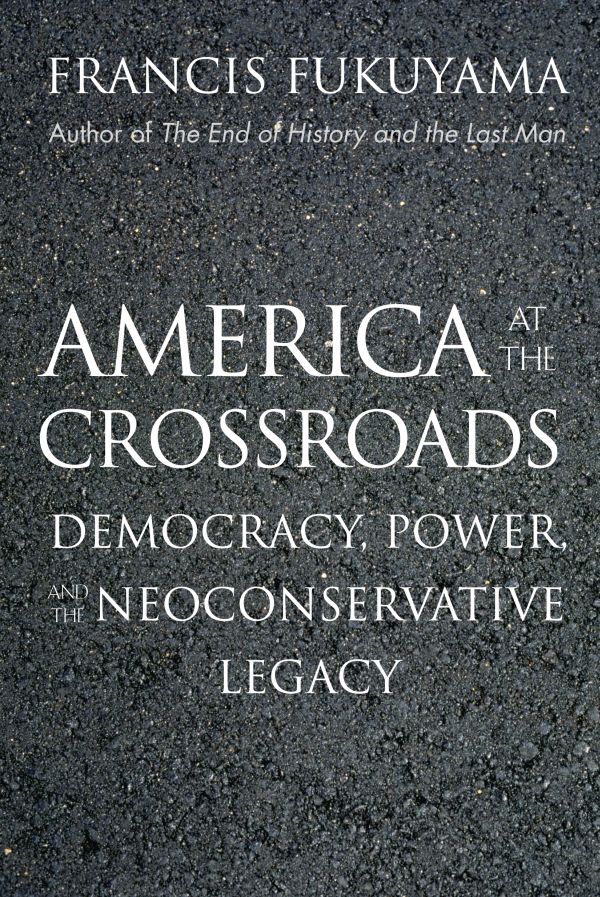 “While he remains sympathetic to the democracy-spreading mission, Fukuyama castigates the unilateral and militaristic turns that gave us such concepts as ‘preventive war,’ ‘benevolent hegemony,’ and ‘regime change.’ Neoconservatives, he contends, have abandoned their fundamental political insight, namely that ambitious schemes to remake societies are doomed to disappointment, failure, and unintended consequences. ‘Opposition to utopian social engineering,’ Fukuyama writes ‘…is the most enduring thread running through the movement.’ Yet neoconservatives today are bogged down in an attempt to remake a poorly understood, catastrophically damaged, and deeply alien semi-country in the Middle East. How did these smart people stray — and lead the country — so far off course?“
“While he remains sympathetic to the democracy-spreading mission, Fukuyama castigates the unilateral and militaristic turns that gave us such concepts as ‘preventive war,’ ‘benevolent hegemony,’ and ‘regime change.’ Neoconservatives, he contends, have abandoned their fundamental political insight, namely that ambitious schemes to remake societies are doomed to disappointment, failure, and unintended consequences. ‘Opposition to utopian social engineering,’ Fukuyama writes ‘…is the most enduring thread running through the movement.’ Yet neoconservatives today are bogged down in an attempt to remake a poorly understood, catastrophically damaged, and deeply alien semi-country in the Middle East. How did these smart people stray — and lead the country — so far off course?“
Um, well, maybe ’cause a lot of ’em read Fukuyama’s The End of History back in the day? Jacob Weisberg reviews Francis Fukuyama’s new book, America at the Crossroads, and, while it’s good to see principled conservatives take this administration’s egregiously inept Iraq policy to task, it’s also hard to believe that the neocons didn’t share Fukuyama’s earlier contention going in that “the universalization of Western liberal democracy as the final form of human government” was both an historical inevitability and in full flourish. Fukuyama can play the aggrieved realist now, but that’s definitely not how he made a name for himself.

I think he’s right, though, that the core of neoconservatism was (at least pre mid-1990s) a belief in the inherent limitations of government action. The backlash to LBJ etc was a big reason why all those guys became neocons in the first place, right?
Yeah, I buy that. Have you read E.J. Dionne’s Why Americans Hate Politics, by the way? He spends a lot of time on this very topic, the transformation of neocons from pragmatism/realism to unbounded ideology. Here’s Daniel Patrick Moynihan back in the day: “Somehow liberals have been unable to acquire from life what conservatives seem to be endowed with at birth, namely, a healthy skepticism of the power of government agencies to do good.” (p.69)
Dionne’s book also has an interesting section on the origins of the New Left and New Right, and how, strangely enough, both ended up making somewhat similar critiques of New Deal Liberalism:
“In retrospect, it is striking that the New Left and the rising right saw the enemy in almost exactly the same terms. The New Left despised ‘Establishment liberals.’ The right hated ‘the liberal Establishment.’ Yet the slight difference in labeling also revealed much – each group put the most important word first. What the New Left disliked about liberals was that they represented the Establishment; what the right disliked about the Establishment was that it was liberal.” (p. 118)
Another interesting passage, speaking of the counterculture (not the New Left):
“Only a few critics of the counterculture saw at the time how easily its worldview could elide into right-wing doctrine. One who did was Michael Walzer, who wrote in 1971 that the philosophy of ‘Do it!’ was ‘the mirror image of political and (why not economic?) laissez-faire.’” (p. 41) Touche.
And, here’s one of the main reasons I dug this book (as you might expect):
“What is required to end America’s hatred of politics is an organizing idea that simultaneously accepts the efficiencies of markets and the importance of a vigorous public life…The idea is what the Founding Fathers called republicanism, before there was a political party bearing that name. At the heart of republicanism is the belief that self-government is not a drab necessity but a joy to be treasured. It is the view that politics is not simply a grubby confrontation of competing interests but an arena in which citizens can learn from each other and discover an ‘enlightened self-interest’ in common. Republicanism is based on the realistic hope, as the poltical philosopher Michael Sandel has put it, ‘when politics goes well, we can know a good in common that we cannot know alone.‘” (p. 354)
Great point…the Dems should run with that. 😉